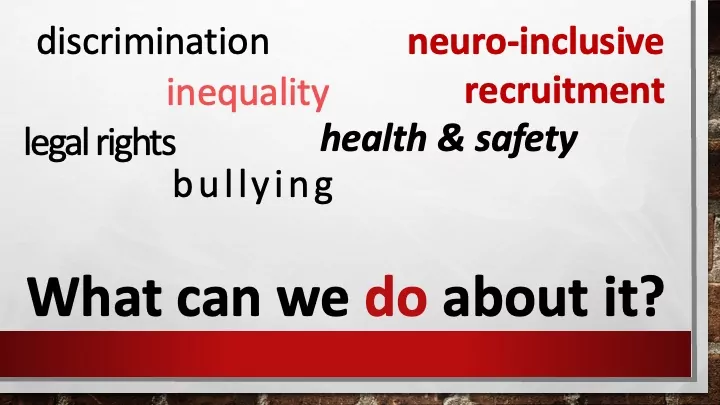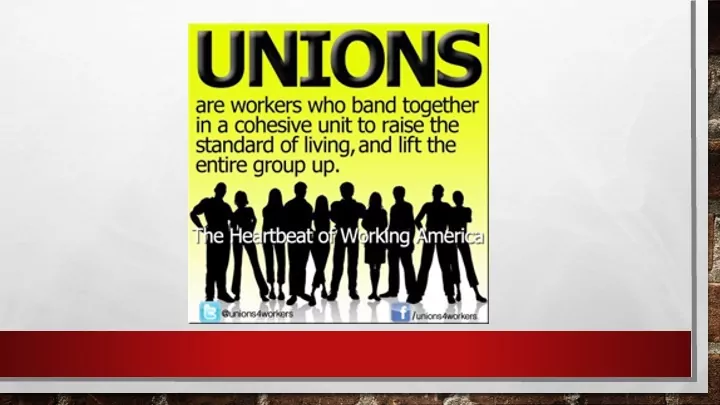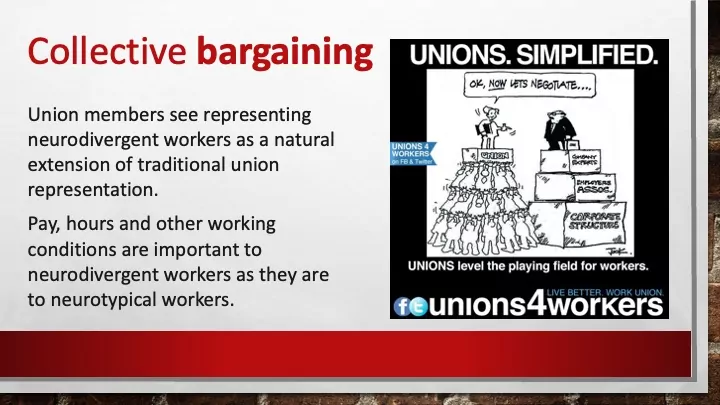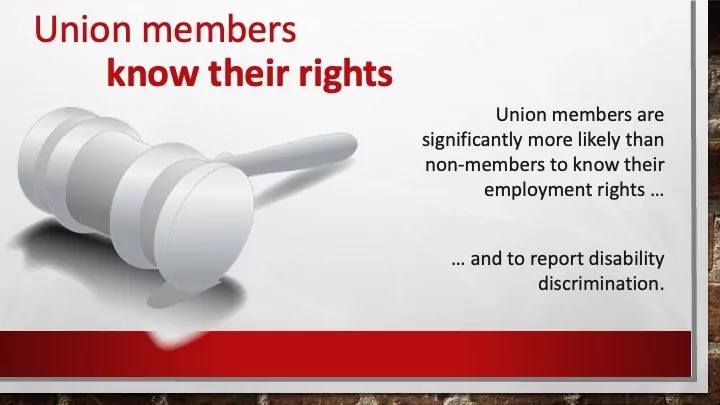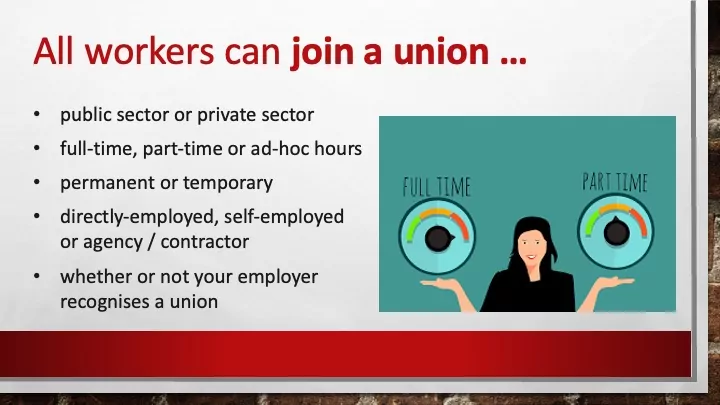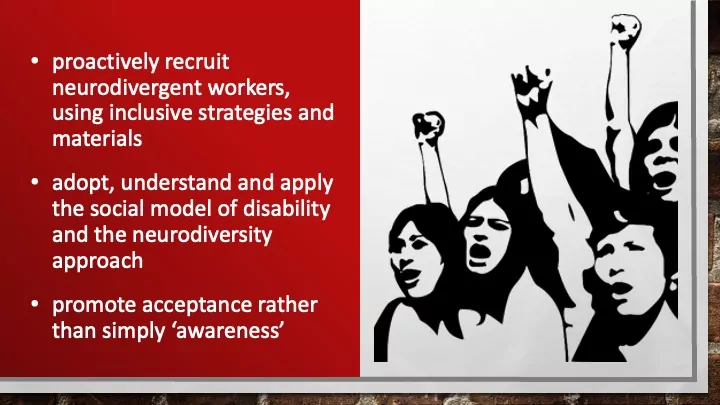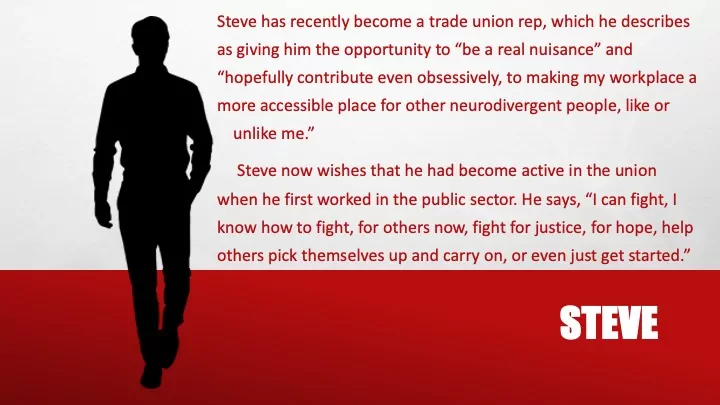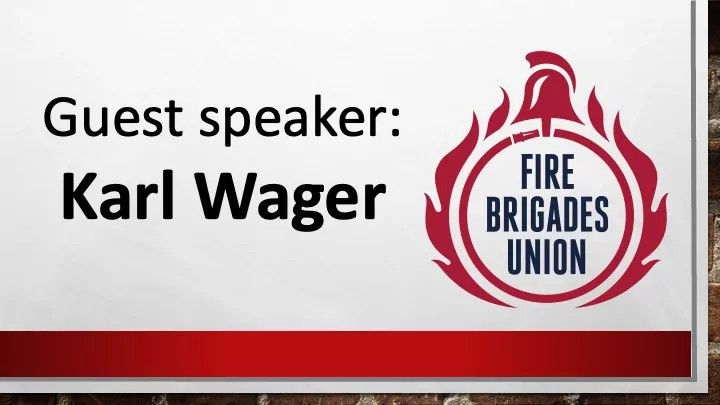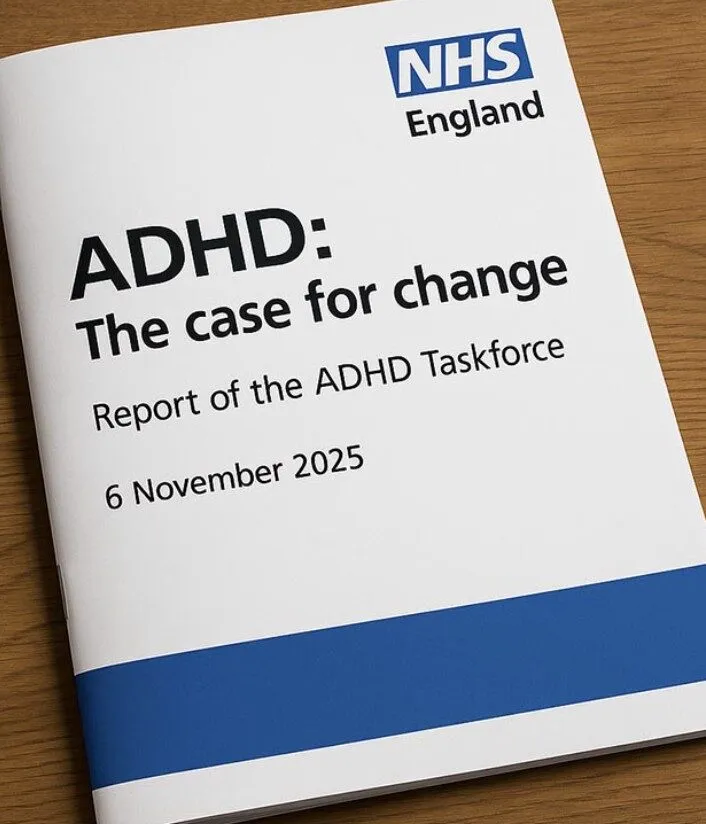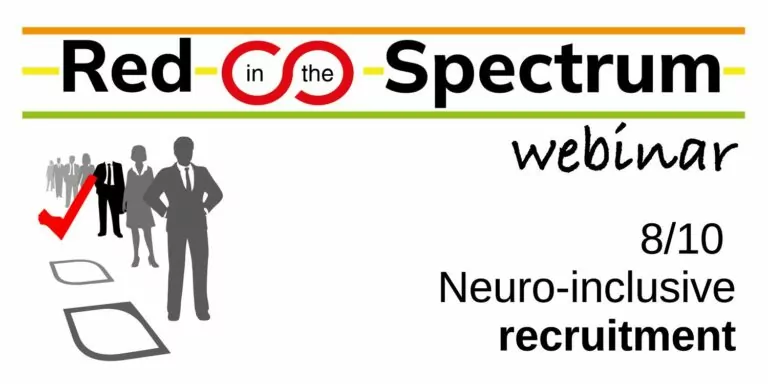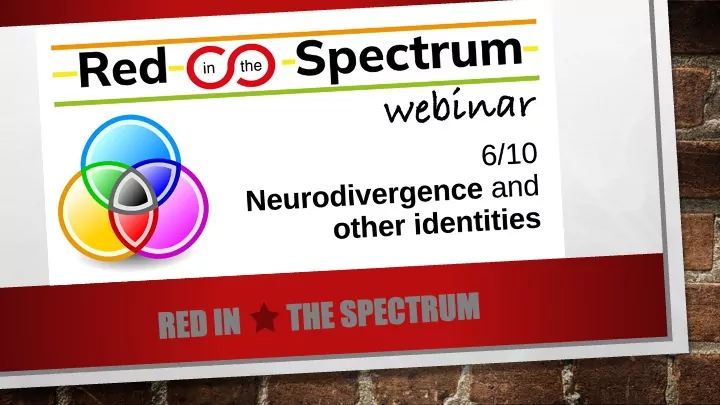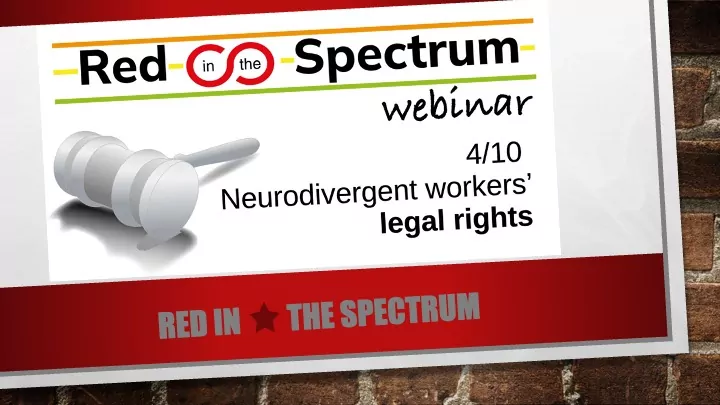Neurodiversity: There is power in a union: Webinar 10
On Sunday 17 March, Red in the Spectrum hosted the final of our series of ten webinars on neurodiversity at work. The webinar was hosted by Janine Booth, and put the case for there being power in a union.
Power in a union
Discrimination – inequality – neuro-inclusive recruitment – legal rights – health and safety – bullying
What can we do about it?
Power in a union: Are you a union member?
83% of webinar participants were trade union members; 17% were not.
Unions which participants were members of included: National Education Union (NEU); Fire Brigades Union (FBU); Unite (general union); Unison (general / public sector union); Public and Commercial Services union (PCS); General, Municipal and Boilermakers Union (GMB – general union).
Power in a union: If you are not a member, why not?
The top two answers were:
- Because there is no union where I work.
- I was a member, but had a bad experience and left.
Contribution from participant:
I joined a union and they were good only once, when I had a job application, but the second time they were not so good in another job application. They said there was no case to answer.
Power in a union: What is a trade union?
Unions are workers who band together in a cohesive unit to raise the standard of living, and lift the entire group up. That is why we say that there is power in a union.
Power in a union: What unions do
Collective bargaining
Union members see representing neurodivergent workers as a natural extension of traditional union representation.
Pay, hours and other working conditions are important to neurodivergent workers as they are to neurotypical workers.
Unions also
- represent individual members
- campaign
- take industrial action.
It is through activity like this that we can benefit from the power in a union.
Union members know their rights
Union members are significantly more likely than non-members to know their employment rights …
… and to report disability discrimination.
Power in a union for everyone
All workers can join a union
- public sector or private sector
- full-time, part-time or ad-hoc hours
- permanent or temporary
- directly-employed, self-employed or agency / contractor
- whether or not your employer recognises a union.
… even if you are not currently working
- Some unions have student membership.
- Many unions have retired workers’ sections.
- Many unions allow you to be a member during periods of time out of your usual job.
- Unite Community is open to all.
Which union?
- the union that is recognised in your workplace
- the union that is recognised in your employer’s other workplaces
- the union that organises in your industry
- different types of unions: industrial unions, craft unions, general unions
Use the TUC ‘union finder’ online tool here.
Power in a union: How unions can be more effective for and with neurodivergent workers
- proactively recruit neurodivergent workers, using inclusive strategies and materials
- adopt, understand and apply the social model of disability and the neurodiversity approach
- promote acceptance rather than simply ‘awareness
- consider neurodivergent workers as subjects, not just objects, of the union’s work
- ensure that union democracy is inclusive of neurodivergent members
- have specific structures through which neurodivergent members can raise issues and concerns
- respond to hostile policies or action by employers
- place specific demands on employers to remove barriers to neurodivergent workers
- effectively represent individual members and raise collective issues related to them
- train union officials, reps and activists about neurodiversity
- make campaigning and industrial action accessible to neurodivergent members
- support and get involved in political and community campaigns for neurodiversity equality
- work with neurodivergent people’s groups in preference to charities
- develop an inclusive culture
- prevent and deal with any harassment or bullying.
If unions do all these things, then they will maximise the power in a union for neurodivergent workers.
Power in a union: Getting involved in your trade union
Philip
“I have worked on the railway for thirty years. A few years after I started, I began making vocal sounds without meaning to, and in 1994, I was diagnosed with Tourette syndrome.
“Tourette’s itself doesn’t cause me a problem. Sometimes other people’s behaviour does, and sometimes structural barriers such as routine changes do.
“I love being involved in RMT, and when I am focusing on my union activity, my tics stop!”
Milly
“I recently started attending union courses. I get great support, including being given information and materials in advance and having the chance to ask questions. I though the courses would be beyond my understanding, but I left them feeling empowered, knowledgeable and more confident at work.”
James
“I have been becoming aware that I am neurodivergent over the last few years, thanks to the growing publicity surrounding neurodivergence and the conditions it includes. The union movement has played a big part in this.
“I’m a health and safety representative and active in my union branch, and I’m now a member of the union’s disabled members’ committee.”
Steve
Steve has recently become a trade union rep, which he describes as giving him the opportunity to “be a real nuisance” and “hopefully contribute even obsessively, to making my workplace a more accessible place for other neurodivergent people, like or unlike me.”
Steve now wishes that he had become active in the union when he first worked in the public sector. He says, “I can fight, I know how to fight, for others now, fight for justice, for hope, help others pick themselves up and carry on, or even just get started.”
Power in a union – Guest speaker: Karl Wager, Fire Brigades Union
Karl had been a firefighter for nearly ten years before being diagnosed as autistic.
He feels that he ‘over-prepares’ and when a planned event does not go to plan, this makes him very anxious. In training, he struggled with knots and lines, to the point that he was warned that he might not pass the course.
Karl believes that his autism has helped him. He can hyperfocus on tasks and scan-read and remember large amounts of text very quickly. He achieved academically and in promotion processes scored highly.
His role in the union has flourished because of his hyperfocus. His need for order allows him to prepare case work. He scrutinises and recites large documents. His ability to pre-plan also helps.
Karl has studied for diplomas in employment law, health & safety and equalities.
He gets frustrated when others don’t work like he does. When traveling for the union and staying in hotels, he has to arrive early to set up his room or workspace.
Karl says that because his brain is firing at one hundred miles per hour, he suffers extreme fatigue.
He believes that because of his differences, he notices others who are struggling and signposts workmates for support and has won reasonable adjustments for them.
Karl chaired the first two three-day, residential Dyslexia and Neurodiversity in the Workplace courses that Red in the Spectrum delivered for the Fire Brigades Union.
Karl spoke to the webinar about his experiences as a neurodivergent trade unionist, and about how neurodivergent workers can benefit from the power in a union, and answered questions and comments from participants, which included:
“I was bullied by a co-worker, and following an incident where they tried to push me down an escalator, we were both summoned to a disciplinary meeting. I asked for a union rep to come with me, and they declined because they said they couldn’t represent members against each other – but then they sent a rep to support the bully.” Answer: All union members are entitled to be represented. In a situation like this, both members would have a rep.
“In my experience, our working conditions are only better if you have a rep who listens/cares.”
“My union rep was very helpful with providing solid and clever advice. They helped me to resolve an issue with set lunch times (put in place by my employer). My union rep advised me to inform my manager in writing that doing this made me feel isolated at the workplace. Management agreed to change lunch times to align with colleagues’.”
Further reading
For in-depth analysis of trade unions, their potential power, and how they currently measure up to the needs of autistic workers, check out this article by Janine: Is there power in a union for autistic workers?
The last word …
From attending these webinars, it has given me the kick up the bum to re-join a union (despite not being recognised at my work) and not just how my workplace will be nice. It has also given me the confidence to chase up a recent job application. Reminding them that as they are signatories to the UK Government Disability Confident Employer Scheme and I meet the minimum requirement for the job, I should be guaranteed an interview!

